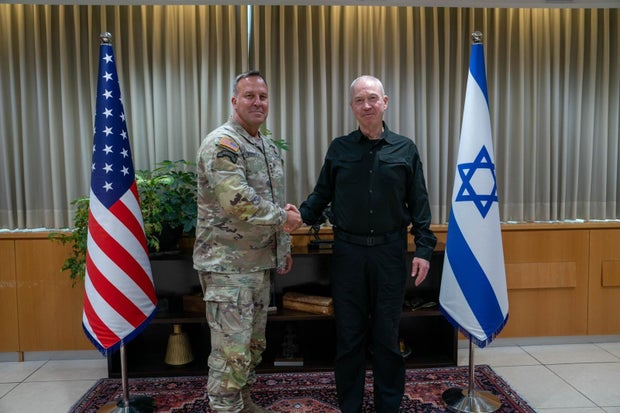[ad_1]
Secretary of State Antony Blinken, in what he said was a “critical moment,” called on parties in the Middle East to work to ease tensions as fears of a larger regional war mount after the killings last week of a senior Hezbollah commander in Lebanon and Hamas’ top political leader in Iran.
“We are engaged in intense diplomacy, pretty much round-the-clock, with a very simple message: All parties must refrain from escalation. All parties must take steps to ease tensions. Escalation is not in anyone’s interests,” he said at a signing ceremony with his Australian counterpart. “It will only lead to more conflict, more violence, more insecurity.”
Blinken added, “It’s also critical that we break this cycle by reaching a ceasefire in Gaza, and that in turn, will unlock possibilities for more enduring calm, not only in Gaza itself, but in other areas where conflict could spread.” He called on all parties to find “ways to come to an agreement, not look for reasons to delay or say ‘no,’” and added, “It is urgent that all parties make the right choices in the hours and days ahead.”
His comments came after President Biden convened the national security team in the Situation Room to discuss developments in the Middle East earlier in the afternoon. Mr. Biden also spoke with King Abdullah II of Jordan Monday, and according to a readout from the White House, the two leaders discussed their efforts to de-escalate regional tensions, including through an immediate cease-fire and hostage release deal. Over the weekend, the Jordanian foreign minister made a rare visit to Iran.
Top military leaders from the U.S. and Israel met In Tel Aviv Monday as fears of a larger regional war mount following the killings last week of a senior Hezbollah commander in Lebanon and Hamas’ top political leader in Iran.
U.S. CENTCOM Commander Gen. Michael Erik Kurilla met with Israeli defense minister Yoav Gallant and Israel Defense Force Chief of the General Staff Lt. Gen. Herzi Halevi to discuss “the coordination of defense cooperation between the respective establishments and militaries,” according to an Israeli readout of the meeting.
Ariel Hermoni/Israeli handout
They also talked about “ways to expand the international coalition facing aggressive activities by Iran and its proxies against Israel, and destabilizing the Middle East region.”
The Lebanese militant group Hezbollah said it launched a drone attack early Monday on northern Israel that the Israeli military said wounded two Israeli troops and set off a fire. Israel and Hezbollah have exchanged near-daily strikes for the past 10 months against the backdrop of the war in Gaza, but they have previously kept the conflict at a low level that had not escalated into full-on war.
The Iranian-backed Hezbollah said in a statement that it targeted a military base in northern Israel in response to “attacks and assassinations” carried out by Israel in several villages in southern Lebanon.
The attack did not appear to be part of a more intense retaliation expected in response to the killing of Hezbollah commander Fouad Shukur in Beirut last week.
Last week’s assassinations of Hamas political leader Ismail Haniyeh in Iran’s capital, Tehran, and Hezbollah commander Shukur in Beirut, raised tensions in the region, and Israel has been bracing for a retaliation from Iran and its allied militias.
Gen. Hossein Salami, the head of Iran’s paramilitary Revolutionary Guard, threatened Israel on Monday over the assassination of Haniyeh, warning that Israel was “digging its own grave” with its actions in its war against Hamas.
“They will see the result of their mistake. They will see when, how and where they will get their response,” Salami said in a speech.
The activity followed a weekend of outreach by Secretary of State Antony Blinken and others in the Biden administration to Western and Middle East allies and partners.
Blinken on Sunday told foreign members in the Group of Seven economic powers that Iran’s response could come in as soon as 24 to 48 hours.
[ad_2]
Source


Leave a Reply